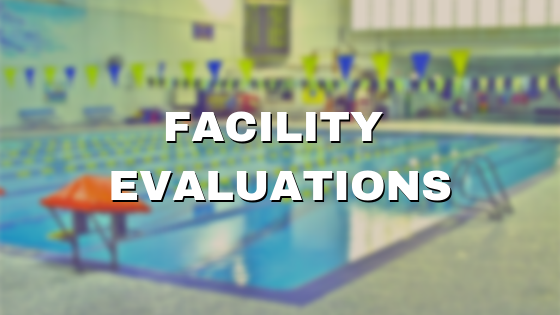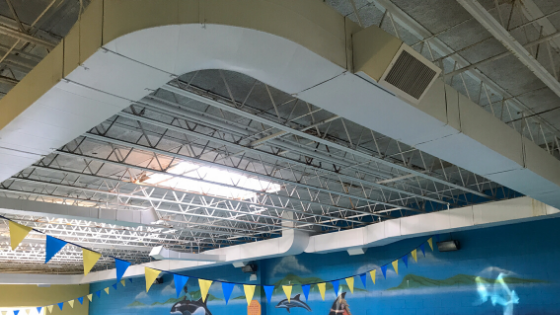What is a Natatorium Study?
Our core service is conducting natatorium facility studies. This article explains what we do (and why), and it should help you decide if it's something you and your facility should invest in.
Covered in this article
What is an Indoor Pool Evaluation?
Essentially, a natatorium study is an in-person site evaluation of an indoor pool facility. It usually lasts between 2-3 hours on site with a local mechanical engineer (of the client's choosing), and someone with building keys (because we access mechanical rooms, rooftops, etc.).
We look for anything and everything in the natatorium that could contribute to poor indoor air quality, and discuss it with the team while pointing things out. We then compile all that information into a detailed report for facility owners and other stakeholders so they can make informed decisions on what to do.
Our report outlines options, describes the challenges with each option, and generally demystifies the process of fixing the air quality issue.
Some of the common examples that contribute to air quality problems include duct locations, hanging banners that may obstruct airflow, and the size and design parameters of the pool dehumidification unit (PDU). We look for common design problems, and also the positive advantages your facility might have.
Why us? Because we have learned that this type of evaluation can only be done by specialists who know exactly what to look for in a natatorium, and who also have the experience to identify what isn't in the natatorium that should be. Otherwise, it's just a report based on comparing the existing building and equipment to the specs of how it was supposed to be built. But that doesn't solve the problem. That just assigns blame.
Our service actually diagnoses the problem AND helps you solve it permanently. And most of our work is done after the site visit. If you hire Chloramine Consulting, our fee hires us until the project is complete...not just when the visit and report are submitted. We are here to assist your team throughout the process.
Why do natatoriums need a specialist?
Mechanical engineers face a dilemma when designing indoor pools.
Relative to the amount of indoor rooms in the world, VERY few of them have swimming pools in them. Natatoriums do not behave like other rooms. They have extremely different moisture, vapor barrier, temperature and other factors to consider.
Put simply, natatoriums are complex. And unless you work with them regularly (like we do), it's a risk to do so...because nobody knows what they don't know.

Since there are so few natatoriums in existence, most engineering firms have never worked with an indoor pool. And if they have, it is probably only a few. For us, natatoriums are the only thing we work with.
We are not engineers, but we do know what information engineers need to design a successful system. We identify and explain that information so an engineer can design a successful remedy to the indoor chloramine problem. This reduces time, risk, and ambiguity.
We develop a facility-specific solution
Every natatorium is unique, but most of them share common traits and problems. Solving an indoor air quality puzzle requires a site visit with photos and videos, measurements, and facility-specific data. Once that is gathered, we work with a professional engineering firm we have done countless natatorium reviews with. They look over our report and polish it, making sure we did not miss anything.
The final product is a report that points out factors that need to be addressed, so that the solution is specific to that exact facility.
We also list out secondary options that can help. We try to offer a "good, better, best" set of ideas, though that depends on the facility. Some natatoriums have plenty of options, whereas some may only have one or two.
Conclusion
Fixing indoor natatoriums can be expensive. Do not throw money at a problem that has not yet been properly diagnosed by experts who know exactly what to look for.
In the medical field, there are general practitioners, specialists, and surgeons. We are a natatorium specialist. We are not engineers, but we know exactly what information they need to design a solution right for your facility.

 By
By




